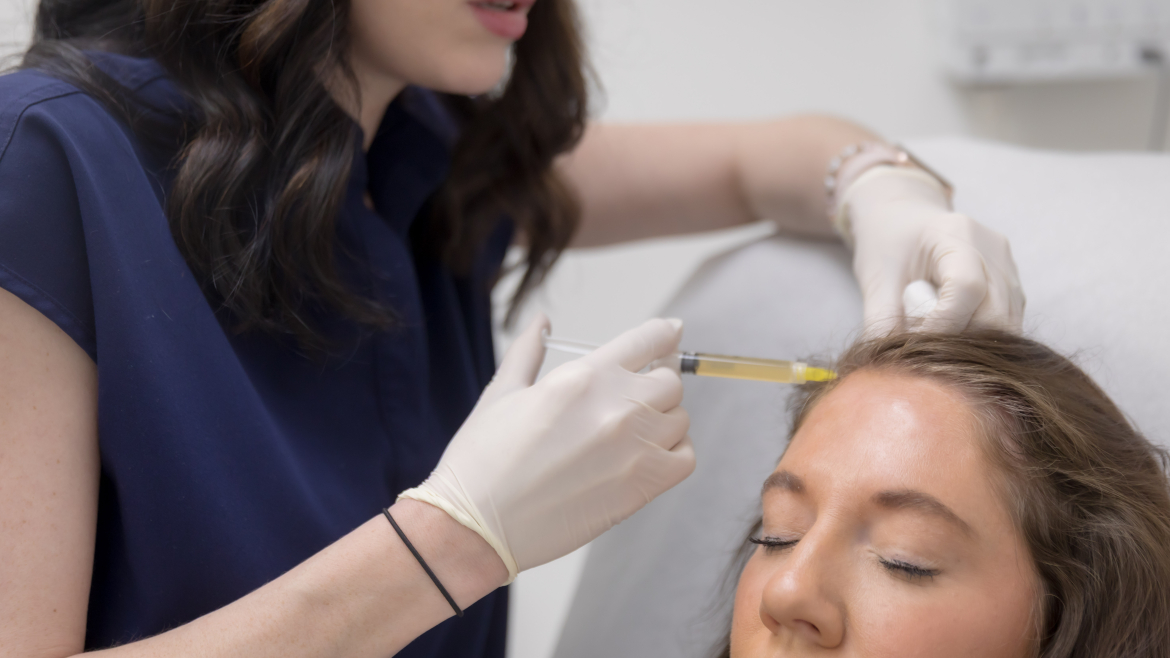August is National Hair Loss Awareness Month, a time to shed light – pun intended – on a concern that affects over 80 million Americans. Hair thinning or shedding can be distressing, impacting self-esteem and confidence. Whether you’re starting to notice more hair in the shower drain or experiencing significant thinning, understanding the why behind hair loss is the first step toward effective solutions.
Common Causes of Hair Loss in Men and Women
Hair loss can be triggered by a wide range of internal and external factors, and it often differs by gender:
In Women:
-
Hormonal changes – pregnancy, postpartum, perimenopause, or menopause
-
Stress or illness – physical or emotional stress, recent illness (including COVID-19)
-
Nutritional deficiencies – especially iron, vitamin D, or protein
-
Thyroid disorders
-
Traction alopecia – tight hairstyles or extensions
-
Autoimmune conditions – such as alopecia areata
In Men:
-
Genetics – male pattern baldness (androgenetic alopecia) is the most common cause
-
Hormonal imbalances – such as elevated DHT (dihydrotestosterone)
-
Stress or illness
-
Nutritional factors
-
Poor scalp health – buildup, inflammation, or seborrheic dermatitis
Proven Solutions for Hair Loss
Thankfully, there are scientifically backed treatment options available today, many of which can be tailored to the underlying cause.
1. PRP (Platelet-Rich Plasma) Injections
PRP is a regenerative therapy that uses the growth factors in your own blood to stimulate hair follicles and promote growth. This minimally invasive treatment is ideal for both men and women experiencing thinning and is often combined with other modalities for enhanced results.
2. Topical Treatments
-
Minoxidil (Rogaine): FDA-approved and effective in both men and women to stimulate hair growth and slow hair loss.
-
Prescription topicals: Compounded formulas may include ingredients like finasteride, tretinoin, caffeine, or spironolactone, depending on the patient’s needs.
3. Nutraceuticals
-
Nutrafol: A targeted supplement line using adaptogens, marine collagen, and botanicals to address stress, hormones, and inflammation – the trifecta often linked to hair thinning.
-
Viviscal: Contains AminoMar™, a proprietary marine complex plus biotin and vitamin C to nourish thinning hair and promote existing growth.
These options are particularly useful for those dealing with diffuse shedding due to stress, illness, or postpartum changes.
4. Lifestyle and Daily Habits
-
Reduce stress through meditation, sleep, and regular exercise.
-
Avoid tight hairstyles and heat styling that can cause breakage.
-
Scalp massage helps increase circulation and deliver nutrients to hair follicles.
-
Eat a balanced diet rich in protein, healthy fats, and essential vitamins like B12, zinc, and iron.
When Should You See a Doctor?
If you’re unsure whether your hair loss is temporary or progressive, it’s time to speak with a trained medical professional. A dermatologist or hair restoration specialist can:
-
Perform lab work to check for underlying health issues
-
Evaluate your scalp and hair density
-
Tailor a customized treatment plan based on your needs
Red flags to watch for:
-
Sudden or rapid hair shedding
-
Patchy or circular areas of baldness
-
Accompanying symptoms like itching, burning, or scaling
-
Family history of pattern hair loss
Early intervention can make a dramatic difference in outcomes. The sooner you address it, the more options you’ll have to preserve and restore hair.
Final Thoughts
Hair loss is common, but it doesn’t have to be permanent or hopeless. Whether it’s through advanced therapies like PRP, proven topicals, or foundational support with nutraceuticals like Nutrafol and Viviscal, help is available. This August, take a proactive step toward understanding your hair health—and reclaiming your confidence.
Need Help Navigating Hair Loss?
Schedule a consultation with our team of medical experts to find the right treatment plan for you. Let’s work together to restore not just your hair—but your peace of mind.


